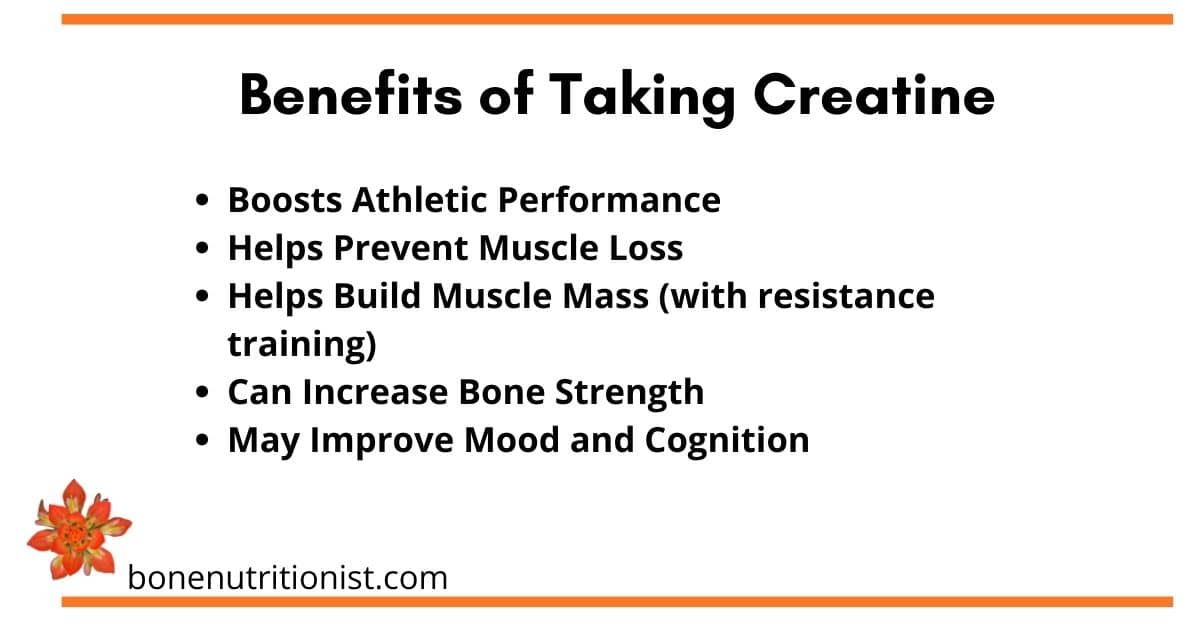Growing research for taking creatine, when over 50, continues to show benefits for increasing strength, power and performance and reducing sarcopenia (loss of muscle). The benefit from taking creatine for muscle health is seen IF one is practicing resistant training. Research also shows promise for improving brain health and maybe even your mood.
Regarding bone health, there’s some evidence that creatine helps improve bone strength but more research is needed in this area. Resistance training is also required for you to see the benefit for bone health.
Feel free to jump ahead by clicking on the links below:
What is Creatine
Food Sources of Creatine
Supplementing with Creatine Over 50
Creatine and Muscle Mass
Recommended Amount of Creatine Over 50
Creatine Over 50 for Bone Health
Creatine Over 50 for Brain Health and Mood
Takeaway Tip
What is Creatine?
Creatine is a substance that is naturally found in muscle cells. It is produced in the body from different amino acids and is mostly made in the liver. Creatine plays a big role in energy production, and is especially important for physical or mental activity. It is commonly used as a supplement to enhance athletic performance, particularly in activities that require short bursts of intense effort, such as weightlifting or sprinting.
Food Sources of Creatine
Creatine is found in animal-based foods like beef, pork, fish, chicken and dairy. While not as rich in creatine, there are some plant-based sources like spinach, avocado, oats, quinoa and legumes. It’s helpful to remember that if a food has protein (amino acids), it is most likely a good source of creatine. You can read more about protein and the amount recommended for optimal bone health here.
Supplementing with Creatine Over 50
On average, we lose around 2 grams of creatine a day, through our urine, and this is often the amount provided in supplements. Our body produces about 1 gram of creatine each day, so we need to make up the difference either from our food or from supplementation. Often, as we age, protein intake decreases (when it should actually increase). A lower protein intake equals less creatine because protein foods are good sources of creatine.

Creatine and Muscle Mass
Research shows that supplementing with creatine is most effective for high-intensity, short-duration or repeated bouts of high-intensity exercise. And, because women tend to have less muscle mass and this is where we store creatine, supplementation for women can show greater performance improvements than for men.
Creatine supplementation can increase functionality and muscle mass in older adults if done alongside resistance training. It is even helpful at preventing sarcopenia (loss of muscle associated mostly with aging).
Recommended Amount of Creatine for Over 50 Adults
Creatine monohydrate comes in powder or capsule form. If you want to supplement with the minimum, try starting with 2 grams/day. Athletes will go through a loading phase of taking about 20 grams/day for six days but that isn’t necessary. Supplementing with 3-5 grams of creatine per day is safe and effective.
Creatine Over 50 For Bone Health
While creatine primarily affects muscle function, there is some evidence suggesting potential benefits for bone health indirectly.
Research studies have explored the relationship between creatine supplementation and bone density, and some findings indicate positive effects. For example, a study published in the Journal of Clinical Psychopharmacology in 2011 suggested that creatine supplementation might have a positive impact on bone mineral density in postmenopausal women.
However, another 2018 meta-analysis, showed that creatine supplementation alone with resistance training in older adults was no more effective than the training alone for improving bone density.
The exact mechanisms is not fully understood, but it is thought that creatine could potentially enhance bone health by promoting muscle strength and overall physical activity. Weight-bearing exercise, such as resistance training, is known to have a positive impact on bone density, and since creatine can support increased muscle strength and power, it may indirectly contribute to bone health.
A 2023 randomized controlled trial conducted in 237 postmenopausal women found that supplementation with creatine for 2 years alongside resistance training preserved the compressive and bending strength of parts of the femur.
The good news is that research continues so that we can fully understand the relationship between creatine and bone density. Because the benefits are clear for muscle gain, creatine with resistance training is recommended.
Creatine Over 50 for Brain Health and Mood
A 2021 review reported that creatine may have positive effects on mood and cognition and is especially helpful for menopausal women who are more susceptible to higher levels of inflammation. An interesting finding in this review showed that women with major depressive disorder who added 5 g of creatine daily with their antidepressant, experienced remission of depression twice the rate of women who just took the antidepressant.
Of course, if you are considering creatine supplementation, you should consult with a healthcare professional or a registered dietitian nutritionist, like Jen Birge, to ensure it is appropriate for your specific health status and needs.
Takeaway Tip for Creatine Over 50
Supplementing with creatine is recommended but you will get the most benefit if you also practice resistance training or weight-bearing exercises on a regular basis. Anywhere from 2-5 grams of creatine monohydrate is recommended daily.
Be sure to check out my Fullscript store, where you get a 20% discount on 3rd-party test supplements, including creatine.
